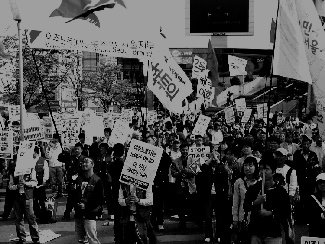A Comparison of Struggle: Centers and MTU
Since the very first years of struggle of the migrant workers it is undeniable that the centers have played a huge part of changing the horrid conditions for the migrant workers. The collective action of the migrants, centers, NGOs, rights groups and unions have generally won recognition for the migrants as workers and thus are deserving of equal rights. Although the concept and implementation of the law is inadequate and not really equal when it pertains to migrant workers the conditions have improved marginally.
Today we have access to venues where we can seek redress for the injustices that we suffer from. The migrant centers have been indespensable to the migrants who lack the documentation, knowledge and language skills to find solutions to their own problems. They have created programs and activities that migrants are able to participate in and have made the Korean experience a little bit more bearable. They have provided migrants with several activities such as cultural and sports events, education programs, trips, community service and assistance in their labor cases.
There are a lot of labor centers in Korea even today and though some centers are not able to survive because of lack of funds, most others continue to thrive. It's a good thing that they are able to maintain their operations since these centers and assitance groups are non-profit, non-stock organizations. And although there a few centers who take advantage of the workers, generally most centers are truly dedicated in "helping and protecting" the migrants.
But why is it that even with the presence of several hundred migrant centers in Korea we have not really been able to address the problem of abuse and discrimination of the migrants? Why is it that statistically, there is a continuing increase in the labor violations among employers? As one volunteer in a migrant center stated in a forum, "when Korea has no more need for the migrant centers, it would be the happiest day in the history of migrant labor".
Although the centers and the Migrant's Trade Union generally provide the same goals and services to the migrant workers, our focus is more in the empowerment of migrants and reforming the law through direct action. The centers focus is more service based and charity. The centers are bound by their christian duty to aid the less priviledged. They encourage compromise between the workers and employers so what happens is they bargain more and fight less in behalf of the workers. The centers also acknowledges the weakness of migrants and would always look upon us as victims and therefore are incapable of defending ourselves. Because of this the centers fail to empower migrants. This in turn makes them entirely dependent on the centers whom the migrants look upon as their saviors. The logic then would play out that migrants are weak and that we need saviors therefore we have to leave our future in the hands of our saviors who apparently know what is best for us. This kind of logic then proves itself to be self-defeating. We call for the recognition of migrants as equals but we see them as weak. This is very contradictory.
Direct action and participation of migrants, involvement of migrants in the decision-making processes, planning and the leadership of migrants, these have been the main goals of the Migrant's Trade Union. Compromise in not an option because comprimising in turn would always create vulnerabilities which the ruling class always use to their advantage.
Services and charity are only band-aid solutions to the problem of the immigrants. The issue will not be resolved if we do not find solutions to the root of the problem.
As christians we are obligated to renounce evil, sin has always been the product of evil. If we continue to be subjected and allow ourselves to be victimized by the sins of the capitalist or compromise with them, wouldn't it mean that we are actually allowing them to perpetuate evil?




